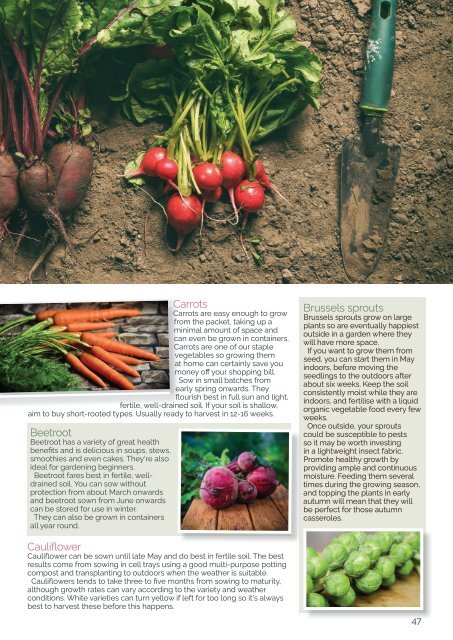Create successful ePaper yourself
Turn your PDF publications into a flip-book with our unique Google optimized e-Paper software.
Carrots<br />
Carrots are easy enough to grow<br />
from the packet, taking up a<br />
minimal amount of space and<br />
can even be grown in containers.<br />
Carrots are one of our staple<br />
vegetables so growing them<br />
at home can certainly save you<br />
money off your shopping bill.<br />
Sow in small batches from<br />
early spring onwards. They<br />
flourish best in full sun and light,<br />
fertile, well-drained soil. If your soil is shallow,<br />
aim to buy short-rooted types. Usually ready to harvest in 12-16 weeks.<br />
Beetroot<br />
Beetroot has a variety of great health<br />
benefits and is delicious in soups, stews,<br />
smoothies and even cakes. They're also<br />
ideal for gardening beginners.<br />
Beetroot fares best in fertile, welldrained<br />
soil. You can sow without<br />
protection from about March onwards<br />
and beetroot sown from June onwards<br />
can be stored for use in winter.<br />
They can also be grown in containers<br />
all year round.<br />
Cauliflower<br />
Cauliflower can be sown until late May and do best in fertile soil. The best<br />
results come from sowing in cell trays using a good multi-purpose potting<br />
compost and transplanting to outdoors when the weather is suitable.<br />
Cauliflowers tends to take three to five months from sowing to maturity,<br />
although growth rates can vary according to the variety and weather<br />
conditions. White varieties can turn yellow if left for too long so it's always<br />
best to harvest these before this happens.<br />
Brussels sprouts<br />
Brussels sprouts grow on large<br />
plants so are eventually happiest<br />
outside in a garden where they<br />
will have more space.<br />
If you want to grow them from<br />
seed, you can start them in May<br />
indoors, before moving the<br />
seedlings to the outdoors after<br />
about six weeks. Keep the soil<br />
consistently moist while they are<br />
indoors, and fertilise with a liquid<br />
organic vegetable food every few<br />
weeks.<br />
Once outside, your sprouts<br />
could be susceptible to pests<br />
so it may be worth investing<br />
in a lightweight insect fabric.<br />
Promote healthy growth by<br />
providing ample and continuous<br />
moisture. Feeding them several<br />
times during the growing season,<br />
and topping the plants in early<br />
autumn will mean that they will<br />
be perfect for those autumn<br />
casseroles.<br />
47

















